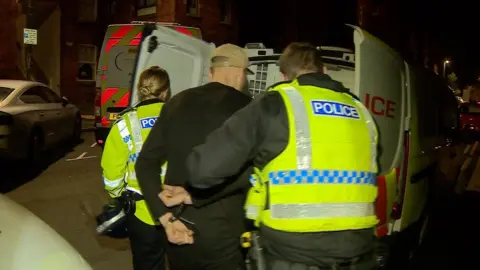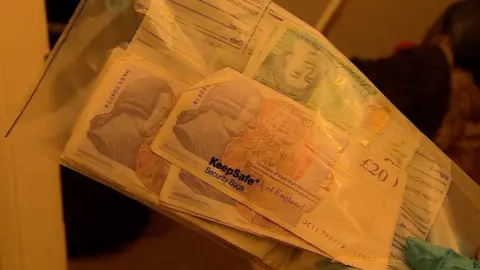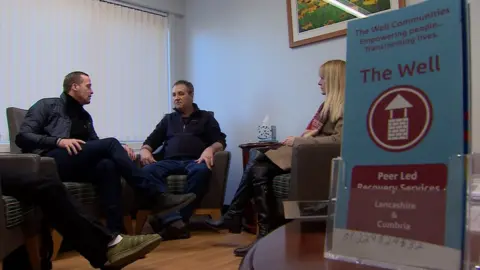Multiple arrests target 'county lines' drugs trade
 BBC
BBCPolice say 22 people have been arrested and 10 charged, in raids tackling the supply of illegal drugs to Cumbria.
The arrests, on Tuesday and Wednesday, took place in Barrow-in-Furness, Coventry and London.
Some of those arrested are alleged to have been involved in sending drugs from London to Barrow, a process known as county lines.
Police are increasingly targeting the town's drug dealers, after a big spike in drug-related deaths in early 2018.
The raids are the culmination of an undercover police investigation, called Operation Horizon, that Cumbria Constabulary has been running since May.
Its main aim was an attempt to disrupt what police say was a county lines drug dealing gang, operating under the name Barry, who were allegedly moving drugs and people from London and Coventry to Barrow-in-Furness.
The force's Supt Rob O'Connor said the arrests demonstrated how seriously police were taking the issue.
He added that it also showed "how determined we are to stem the flow of drugs into south Cumbria" after his officers had travelled to arrest people in London and Cumbria.
Police also seized thousands of pounds in cash and quantities of heroin and crack cocaine in the raids.

Between December 2017 and April 2018, there were 12 drug-related deaths in Barrow, a figure completely out of proportion to the size of the town.
Much of the blame for the spike in deaths was put down, in particular, to the increasing supply of heroin and crack cocaine.
Gangs from London and the West Midlands had started supplying into the town, adding to the usual dealers from Liverpool and Manchester.
The deaths sparked police, council and health officials to improve the support services available to drug users in Barrow.
One of the schemes now being offered is an outreach service, where counsellors from The Well, a drug rehabilitation charity, go to the local hospital, Furness General to meet patients who have drug or alcohol problems.
The project, which has been running since June, sees counsellors, who are all volunteers and have themselves previously struggled with addictions, approach people while in their hospital beds, and offer to help them overcome their problems.
The deputy medical director at the hospital, Dr Paul Grout, says the scheme has made a huge difference.
"By being able to provide support for these patients before they leave hospital, which has then continued when they are out in the community, it prevents the revolving door problem with these patients that we've had until now," he said.

Cumbria County Council have also set up a drug-related deaths panel, to understand why so many people have died in the town.
"They were estranged from their families, had mental health issues, or suffered benefit sanctions," says Lesley Graham, who chairs the panel.
"Males living alone, extremely high-risk people, a lot of polydrug use, it wasn't just one single drug, it was a mixture and, when we did toxicology reports, we found extremely high contents of cocaine and heroin."
Long-term problem
This combination of initiatives appears to be having an effect and the rate of drug-related deaths in the town has fallen; police believe there have been only five since April.
Despite the police raids, everyone in Barrow accepts that arrests alone will not solve the town's long-term problem with illegal drugs.
Ensuring that users continue to have ready access to good quality health and support services is vital, as is giving the town's children alternatives to turning to drugs in the first place.
"I've two children myself - OK, they're 26 and 24 - and one day I hope to have grandchildren," says Ms Graham. "I want to make sure that anything that we put in place improves Barrow and is sustainable."
